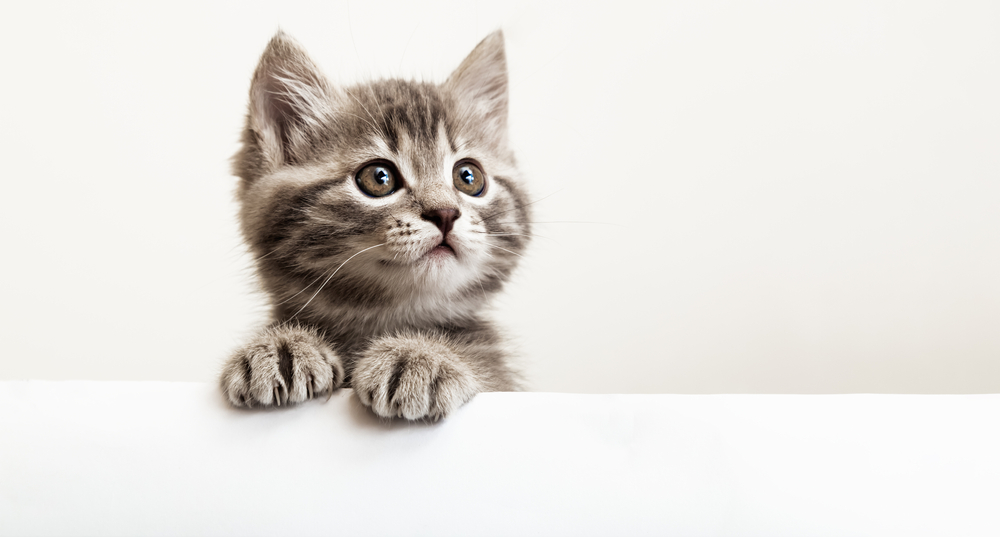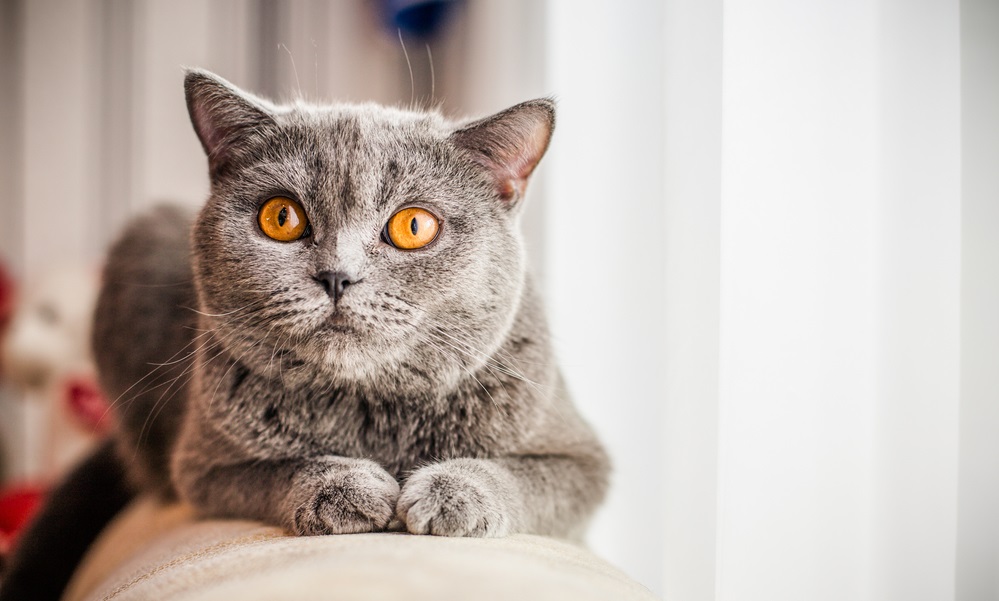Updated 04/13/2025
“Those feline eyes entrap me; I am your helpless prey. Even if I wanted to, I cannot look away.” These words by John Hansen capture the mystery and power of a cat’s eyes. There’s nothing quite like them. They are striking, and when they have a problem, it’s alarming.
Cat eye irritation and swelling can indicate several conditions, some of which threaten vision. Take any eye problem seriously because vision is a precious thing.
In this guide, we’ll describe what might be causing your cat’s eye problems, how your veterinarian can help, and what you can do at home to promote healing and provide relief.
Puffy Peepers
Part of the eye and the surrounding structures can become swollen. Swollen eyelids are called blepharitis. The transparent membrane covering the eyeball and the inside of the eyelids is called the conjunctiva, and it can also swell. Inflammation here is called conjunctivitis. Blepharitis and conjunctivitis may occur individually or simultaneously, in one eye or both.
Symptoms include:
- Excessive blinking
- Eye redness
- Squinting
- Swelling
- Watery discharge from the eyes
Blepharitis and eyelid inflammation might be in response to a generalized skin problem or local irritation or infection. Conjunctivitis can be caused by trauma, dryness, or infection that is local or generalized.1
While veterinarians often prescribe eye drops to soothe and treat blepharitis and conjunctivitis in cats, you can take an extra step to provide relief and prevent future irritation by using a cleansing eye wash at home.
Vetericyn Plus Antimicrobial Eye Wash is a non-toxic, cleansing, and pain-relieving solution that does not contain antibiotics or steroids. It gently removes debris, provides relief, and helps prevent problems. So, if you were wondering, “How can I treat my cat’s eye infection at home while waiting for the vet?” this is one home treatment option to use as you prepare for your veterinary appointment. Once you receive a diagnosis, learn more about how to treat conjunctivitis in cats.

Triggers of Cat Eye Swelling
Understanding the potential triggers of swollen eyes in cats can help you recognize symptoms early and seek timely treatment. Below are some of the most common conditions and irritants that may lead to cat eye swelling.
#1 Trauma
Physical damage to the eye or the surrounding tissues can lead to swelling. Trauma can occur during fights with other animals, during playtime, or as a result of exposure to irritants such as cleaners and fragrances.
#2 Allergies
One of the most common causes of swollen eyes in cats is congenital allergies. Just like humans, cats are sometimes born with a sensitivity to environmental or food allergens that can cause watery, swollen, or irritated eyes.2
It’s important to monitor your cat’s health after exposure to laundry detergents, air fresheners, or their food. In addition to swollen eyes, cats experiencing an allergic reaction may scratch themselves excessively or rub against furniture or the floor to itch the irritated area. Watch for symptoms of cat allergies and let your veterinarian know if they occur.
#3 Symblepharon
When the conjunctiva, the clear membrane covering the eyeball and the inside of the eyelids, becomes adhered to other eye tissues, it is called symblepharon.3 It usually occurs in response to Feline Herpesvirus infection but may also be caused by other factors. Feline Herpesvirus isn’t contagious to people but quickly spreads to other cats.
Talk to your veterinarian as soon as possible to help prevent symblepharon from developing or worsening.
#4 Upper Respiratory Tract Infections
The upper respiratory tract includes the nose, sinuses, oral and nasal cavities, and throat. Viruses, bacteria, and fungi can infect the upper respiratory tract. These can result in swollen or irritated eyes. Signs of an upper respiratory tract infection include4:
- Congestion
- Conjunctivitis
- Coughing
- Decreased appetite
- Discharge from the nose and eyes
- Lethargy (decreased activity)
- Mouth ulcers
- Sneezing
Since conjunctivitis is a common symptom of an upper respiratory tract infection, any combination of the above symptoms with any conjunctivitis symptoms should be examined by a vet.
#5 Keratoconjunctivitis Sicca
Red eyes in cats are a common symptom of keratoconjunctivitis sicca, also known as dry eye, which means your cat isn’t producing enough tears to keep the eyes adequately moist. In cats, Feline Herpesvirus may again be the culprit for dry eye, as it can lead to chronic eye dryness. However, some medications and immune system problems may also be to blame.5 A veterinarian can treat your cat’s swollen and dry eyes with artificial tears, prescription eye drops, and inflammation-reducing medications that combat the root cause.

Cat Eye Care: What You and Your Vet Can Do
If these symptoms are severe, if your cat’s pupils are different sizes, or if your cat has other signs of illness, it could be an eye emergency, so call your veterinarian right away.
Prevention is the best medicine, and Vetericyn pet eye care products help prevent problems, soothe pain, and alleviate itch. Our eye wash is a non-toxic solution that doesn’t contain antibiotics, alcohol, or steroids. It flushes irritating dirt and debris away, providing instant relief, helping maintain eye health, and reducing common problems. It’s great for dogs, too.
Gently flush the affected eye 3 to 4 times a day. Read our blog for step-by-step instructions on how to clean a cat’s eyes properly.
Vetericyn’s pet care mission is pet wellness. Shop our pet care products online or in-store, and keep all your furry, feathery, scaley, or leathery friends thriving, healthy, and happy.
 Reviewed by Dr. Kathy Adamson
Reviewed by Dr. Kathy Adamson
Dr. Kathy Adamson earned her bachelor’s degree from the University of Notre Dame and her Doctor of Veterinary Medicine degree from the University of Wisconsin-Madison School of Veterinary Medicine.
She completed a one-year small animal medicine and surgery internship at the North Carolina State College of Veterinary Medicine. Alongside her studies, Kathy worked in a research lab, contributing as an author and co-author to various journal articles.
She has also pursued medical writing and editing certification through the University of Chicago Graham School. Currently, she runs KMA Veterinary & Medical Writing, a freelance medical writing company, serves as the Digital Content Manager for the Greater Chicago Area Chapter of the American Medical Writers Association, is a member of the AMWA Communications Committee, and enjoys writing about healthcare topics for people and their cherished pets.
![]() https://www.linkedin.com/in/kathyadamsondvm/
https://www.linkedin.com/in/kathyadamsondvm/
Sources:
- Gelatt KN. Disorders of the Conjunctiva in Cats – Cat Owners. Merck Veterinary Manual. Accessed March 24, 2025. https://www.merckvetmanual.com/cat-owners/eye-disorders-of-cats/disorders-of-the-conjunctiva-in-cats
- White SD, Morello KA. Allergies of Cats – Cat Owners. MSD Veterinary Manual. Accessed March 24, 2025. https://www.msdvetmanual.com/cat-owners/skin-disorders-of-cats/allergies-of-cats
- Church M, Morgan R, Hamor RE. Symblepharon (Feline). VIN.com. Published online March 14, 2021. Revised November 8, 2021. Accessed March 26, 2025.
- Weir M, Yuill C. Feline Upper Respiratory Infection | VCA Animal Hospitals. Vca. Accessed March 24, 2025. https://vcahospitals.com/know-your-pet/feline-upper-respiratory-infection
- Brooks W. Dry Eye (Keratoconjunctivitis Sicca) in Dogs and Cats. VIN.com. Published online August 8, 2017. Accessed March 25, 2025.